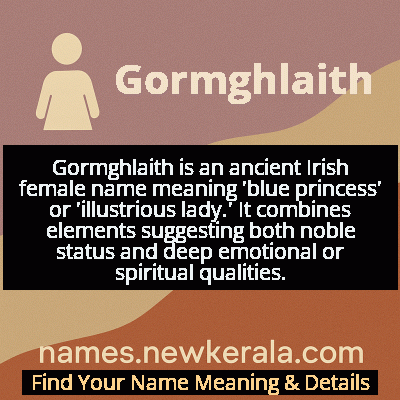Gormghlaith Name Meaning & Details
Origin, Popularity, Numerology Analysis & Name Meaning of Gormghlaith
Discover the origin, meaning, and cultural significance of the name GORMGHLAITH. Delve into its historical roots and explore the lasting impact it has had on communities and traditions.
Name
Gormghlaith
Gender
Female
Origin
Irish
Lucky Number
1
Meaning of the Name - Gormghlaith
Gormghlaith is an ancient Irish female name meaning 'blue princess' or 'illustrious lady.' It combines elements suggesting both noble status and deep emotional or spiritual qualities.
Gormghlaith - Complete Numerology Analysis
Your Numerology Number
Based on Pythagorean Numerology System
Ruling Planet
Sun
Positive Nature
Leaders, ambitious, highly driven, self-reliant, innovative.
Negative Traits
Overly aggressive, domineering, impatient, selfish.
Lucky Colours
Red, orange, gold.
Lucky Days
Sunday.
Lucky Stones
Ruby, garnet.
Harmony Numbers
2, 3, 9.
Best Suited Professions
Entrepreneurs, managers, engineers.
What People Like About You
Courage, determination, leadership.
Famous People Named Gormghlaith
Gormlaith ingen Murchada
Irish Queen
Queen of Munster and mother of King Sitric Silkbeard of Dublin
Gormlaith of Leinster
Irish Princess
Daughter of King Donnchad Midi and prominent political figure
Gormlaith Ní Briain
Noblewoman
Member of the powerful O'Brien dynasty in medieval Ireland
Name Variations & International Equivalents
Click on blue names to explore their detailed meanings. Gray names with will be available soon.
Cultural & Historical Significance
The name's consistent appearance in royal genealogies throughout the 9th to 12th centuries demonstrates its prestige and the high status afforded to women who bore it. In a society where lineage and family connections determined political power, the name Gormghlaith came to symbolize both noble birth and the important role women played in maintaining dynastic continuity. The stories of these historical figures, particularly Gormlaith ingen Murchada who was married to multiple kings and mothered significant rulers, illustrate how women could exercise considerable influence within the constraints of medieval Irish society. This historical legacy gives the name enduring cultural significance as a symbol of Ireland's rich aristocratic heritage and the often-overlooked power of women in early Irish history.
Extended Personality Analysis
The name Gormghlaith evokes personality traits of depth, resilience, and quiet authority. Those bearing this ancient name are often perceived as having a profound connection to tradition and heritage, carrying themselves with a natural dignity that commands respect. The 'blue' element in the name's meaning suggests someone who experiences emotions intensely and possesses deep loyalty to their principles and loved ones. This emotional depth is balanced by the 'princess' component, which implies leadership qualities, strategic thinking, and the ability to navigate complex social situations with grace and intelligence.
Individuals named Gormghlaith typically exhibit strong character traits of perseverance and cultural pride, often serving as guardians of family traditions and historical knowledge. They tend to be reflective, thoughtful people who value authenticity and depth in their relationships. While they may appear reserved initially, they possess inner strength and conviction that emerges when defending their values or supporting those they care about. The historical weight of the name suggests someone who understands the importance of legacy and continuity, often demonstrating wisdom beyond their years and a natural inclination toward mentorship and guidance. Their combination of emotional sensitivity and principled determination makes them both compassionate and formidable in equal measure.
Modern Usage & Popularity
In contemporary naming practices, Gormghlaith remains an exceptionally rare choice, primarily confined to families with strong Irish cultural connections or those actively participating in Irish language revival movements. The name sees occasional use in Gaeltacht regions (Irish-speaking areas) and among diaspora communities committed to preserving traditional Gaelic names, but it has not experienced the revival seen with other ancient Irish names like Aoife or Saoirse. Its complexity—both in spelling and pronunciation for non-Irish speakers—along with its strong historical and aristocratic connotations, makes it a challenging choice for modern parents. The name is virtually absent from popular baby name lists and maintains its status as a distinctive, deeply traditional option rather than a trending choice. Those who do choose Gormghlaith typically do so as a conscious cultural statement or to honor specific family heritage, recognizing that the name carries significant historical weight that may shape the child's connection to Irish identity.
Symbolic & Spiritual Meanings
Symbolically, Gormghlaith represents a powerful fusion of emotional depth and noble heritage. The 'gorm' (blue) component carries multiple layers of meaning in Irish symbolism—it represents both the constancy of loyalty and the profound depth of true feeling, while also evoking the melancholy often associated with Irish cultural expression. This blue symbolism connects to the sea and sky, suggesting vast emotional capacity and spiritual depth. The 'ghlaith' (princess/sovereign) element symbolizes lineage, authority, and connection to ancestral wisdom, representing the bearer as someone who carries forward cultural traditions and family legacy. Together, these elements create a symbolic portrait of someone who balances deep emotional intelligence with a sense of responsibility to heritage and community. The name evokes the image of ancient Irish royalty standing at the edge of the sea—both rooted in tradition and open to the vast possibilities of human experience, embodying the enduring spirit of Irish culture through its combination of earthly authority and emotional transcendence.

